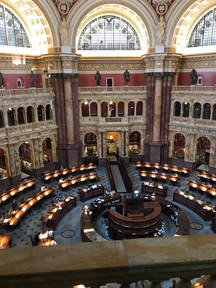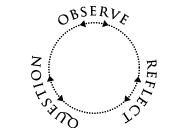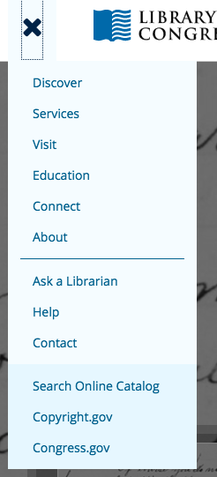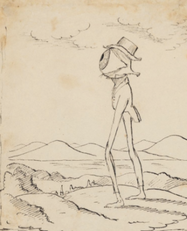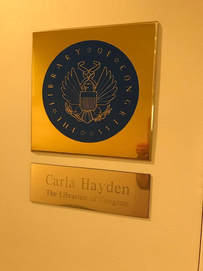Our district Director of Teaching and Learning forwarded a promotional email she had received and we noticed that there was a new STEM program. She was supportive of my recruiting a team which was surprisingly easy. I attended a week for generalists and librarians, along with a physics teacher. The STEM week was attending by a biology and a chemistry teacher. This was truly a unique opportunity to work with disciplines that don’t typically have a lot of overlap at the high school level.
The “hamburger” at the top left of the page is how to most quickly navigate to educational resources.
Click “education” on the drop down.
This opens the Education Resources from the Library of Congress. There you will find a wonderful array of curated resources. Perhaps the most useful for school librarians working with classroom teachers is the Primary Source Sets resource page. These primary source “bundles” were designed to support major curricular units so there is a lot there.
There was also time for a “behind the scenes” tour of the main library which included an after hours visit on the floor of the main reading room. A truly humbling and awe inspiring moment. Our guide pointed out places where various movie scenes had been shot, and carefully explained all the inaccuracies in the movie National Treasure. We got to go into the stacks and view the acute overcrowding and method of double-shelving used in an attempt to store everything.
A requirement of the program is that participants develop a lesson built around a primary source, and are given more than enough time to accomplish this during the week. On the last day there is a session where you share your lesson and get feedback. We are also required to attend a follow up webinar, and submit a reflection on how our lesson went. These final requirements occur during October-November. The STEM week had a different materials binder that focused more on science and engineering, and their field trip included a visit to the preservation and restoration laboratories where they met with archivists about the challenges and chemistry involved in their work.
For those who are interested, I did my project on the Transcendentalists of Concord. This is the first lecture in a one-week series and is designed to spark interest, curiosity, and introduce students to a sense of time and place. Using images, maps, and photos, student can begin to compare the Concord of today with that of the mid-1800’s and develop context and understanding of what contributed to the development of the movement and it’s relevance today. I also use this slide deck for professional development with teachers to model the use of primary sources, and it has proved useful.
The Library of Congress and its mission today are as relevant as ever. The catalogs are open and free to anyone in the world and there are over 25 million digital catalog records. These include free data sets made up of the first MARC (Machine-Readable-Cataloging) records from the 1960’s to 2014. In addition to making the resources of the library available, the massive data release in 2017 also challenges researchers to investigate new topics through the identification of patterns and trends revealed through big data analysis (Levine, 2017). The implications and possibilities for research are very exciting.
If you go, bring a sweater. The rooms we worked in all week were freezing cold! The daily sessions were from 8-4pm so there was no time during the week to go to museums. Don’t plan on much tourism. The dress code is casual school dress. Being comfortable and warm is the priority. Leave room in your suitcase because you will also be given a ton of free books from the Library of Congress. Very exciting for this librarian was Dr. Carla Hayden’s office was at the other end of our floor! The program itself is free and participants are given meal vouchers for breakfast and lunch at the lovely and well stocked Library of Congress cafeteria. I ate very well and there was credit still left on the voucher. Participants were offered a reduced rate at the Capitol Hill Hotel (which also had breakfast included) right next to the library which made it incredibly convenient. Many participants stayed there and it was a great opportunity to make connections with others, but many also stayed with family, friends, or made accommodations with an AirBNB.
One thing we did have time for was a sunset tour of the National Mall on Segways! It was unbelievably fun, the Segways were really easy to maneuver and navigate, and for the first time I really got a feel for the layout of beautiful Capitol Hill. I was fortunate to have my daughter join me for the week and it was the highlight of our time together. I hope you get a chance to go!
Levine, M. (2017, July 19). The Library of Congress opened its catalogs to the world. Here’s why it matters. Retrieved October 10, 2017, from The Conversation website: http://theconversation.com/the-library-of-congress-opened-its-catalogs-to-the-world-heres-why-it-matters-78570.
Library of Congress (Cartographer). (n.d.). Primary source analysis tool [Chart]. Retrieved from http://www.loc.gov/teachers/primary-source-analysis-tool/.

